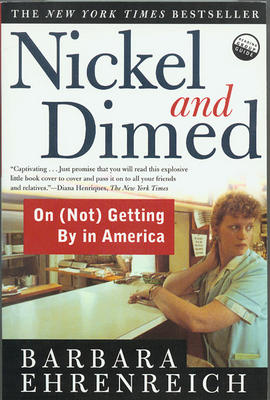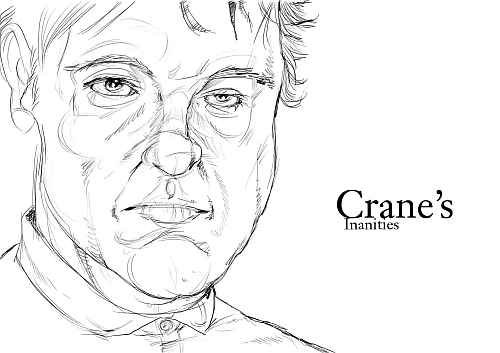
I finished Nickel and Dimed by Barbara Ehrenreich last night. It's an excellent book written by a very skilled writer. She's a little like Jonathan Franzen or Gore Vidal or Ayn Rand (actually not at all like Ayn Rand) in that she writes with a voice and perspective so distinctive and powerful that it gets in my head while I'm reading her words: whatever I'm thinking, reading, or doing, I feel like I should have her opinion on it. It's strongest after I've read a particular book with a strong authorial presence, (I felt doped up for a day or two after reading Rand's The Fountainhead; I had Franzie in my head for what felt like weeks after I finished The Corrections). This sensation of head-invasion was pretty strong this morning. While I was reading an unbelievable NYTimes article about Wal-Mart and their leaked memo about how they intend to cut employee benefits, I felt let down that nowhere in the article did they include Ehrenreich's opinions on the matter. Anyway, back to the book. Limited in its scope, Nickel and Dimed isn't trying to be an indictment of the capitalist system in this country (though it does a pretty fair job at that), but rather serves as a response to the bipartisan legislation in Clinton's second term that supposedly "ended welfare as we know it". The new law did not include any provision to monitor the effects of the legislation on those it's supposed to be lifting out of the "welfare state". So she did one. Her book butts right up against the popularly-held notion that if a poor person gets any kind of job and holds it, they'll be all right, and they'll rise above the poverty-line. Well, it just doesn't happen like that. Ehrenreich tries to subsist on the wages offered to working class people in three so-called "unskilled" jobs, in three different places, and she can't manage it.
She waits tables in Florida, scrubs floors in Maine, and works at a Wal-Mart in Minnesota. The first two chapters are eye-opening, but the third, the one about getting a low-paying retail job, is the one that's sticking with me as the most maddening. She applied at a few places in Minneapolis, Minnesota (right in the heart of a historically blue state), and two called her back, serious about hiring her: Menard's (a regional hardware store) and Wal-Mart. Of course, this being America and they being employers of "unskilled" labor, each one wanted her to submit to a drug test. The following is from a footnote on page 128.
"There are many claims for workplace drug testing: supposedly, it results in reduced rates of accidents and absenteeism, fewer claims on health insurance plans, and increased productivity. However, none of the claims has been substantiated, according to a 1999 report from the American Civil Liberties Union, "Drug Testing: A Bad Investment." Studies show that preemployment testing does not lower absenteeism, accidents, or turnover and (at least in the high-tech workplaces studied) actually lowered morale. Furthermore, the practice is quite costly. In 1990, the federal government spent $11.7 million to test 29,000 federal employees. Since only 153 tested positive, the cost of detecting a single drug user was $77,000. Why do employers persist in the practice? Probably in part because of advertising by the roughly $2 billion drug-testing industry, but I suspect that the demeaning effect of testing may also hold some attraction for employers."Well, Barbara had had a "chemical indiscretion" in recent weeks, so she has to go through a detox regimen to get a job at either place. There are lots of products out there designed to "clean" out your system so a drug test won't detect any marijuana in your urine. As I've said on this blog before, heroin, cocaine, LSD, etc., are all water-soluble and wash out of your body in three days or less; marijuana is really the only drug detectible by most drug tests because it can stay in the body for months. So she takes a product sold at GNC called CleanP, and, just like that, she beats the test. So not only are drug tests essentially useless and without benefit to anyone, (not to mention a violation of our civil right not to refuse illegal search and seizure), but products designed to render the results of these drug tests virtually meaningless, exist and are sold openly and legally across the country. Ehrenreich says, "It rankles -- at some deep personal, physical level -- to know that the many engaging qualities I believe I have to offer -- friendliness, reliability, willingness to learn -- can all be trumped by my pee." Which I totally agree with. Anyway, I include her views on the subject to show that I'm not alone in thinking that drug tests are needless, without merit and, most importantly, humiliating.
Another thing I want to mention about her experience with these two jobs is this: she only learns she's passed both drug tests because she's told to report to orientation by both companies. She guesses she's hired, though she's never told so by anyone. This is sort of a quasi-hire. She thinks about it, and comes up with this theory for this ambiguity, which I think is dead-on:
"Why hadn't I asked all these questions about wages and hours before? For that matter, why hadn't I bargained with Roberta when she called to tell me I'd passed the drug test -- told her $7 an hour would be fine, as long as the benefits included a free lakeside condo with a hot tub? At least part of the answer, which I only figured out weeks later, lies in the employers' deft handling of the hiring process. First you are an applicant, then suddenly you are an orientee. You're handed the application form and, a few days later, you're being handed the uniform and warned against nose rings and stealing. There's no intermediate point in the process in which you confront the potential employer as a free agent, entitled to cut her own deal. The intercalation of the drug test between application and hiring tilts the playing field even further, establishing that you, and not the employer, are the one who has something to prove. Even in the tightest labor market -- and it doesn't get any tighter than Minneapolis, where I would probably have been welcome to apply at any commercial establishment I entered -- the person who has precious labor to sell can be made to feel one down, way down, like a supplicant with her hand stretched out."She goes on later to talk about how the taboo against discussing one's pay helps all employers keep wages down, even in a tight labor market. If Target pays $9/hr. and Wal-Mart pays $7/hr., how does someone working at Wal-Mart know to make the move over to Target to do the same work, if no one at Target is saying how much they're making? Especially if there is no real interview in which to discuss the subject directly with the employer. At Wal-Mart, it is against company rules to talk about how much you make -- people have been fired for doing it.
I think I had to sign something at NeoPets that said as much, their reasoning being that such talk might cause "undue resentment" between co-workers. Of course we all did talk about it, quietly, always quietly, and yes, I remembered feeling resentment, but certainly not towards my co-workers. Remembering back to when I was hired there, I get angry, as much at myself as at them. I applied because the ad on Monster said $8-$10 an hour. After the first interview, I was told it would be more like $8 - $9 an hour. During the final interview, my would-be boss, Dale, asked if I remembered what the pay was. I said, "I thought she said $9," knowing she'd given me a range rather than a number, but thinking what an ass I'd be to utter the number 8 when they hadn't mentioned numbers yet. Dale and the COO, Lee, laughed heartily. "Nice try," Lee said, admiringly, as though I'd really been trying to make a joke, or pull a fast one. Simp-like, I laughed, too. And though I didn't get it then, I did later: they were never going to pay more than $8/hr for that job; they used $8-$10 in their ad as a lure, hoping to catch a timid, gullible fish like me who couldn't even say, "Give me a night to think about it," after I was told "You're hired." I just said, "Ok, great," and proceeded to work at that paltry wage for two weeks short of an entire year. Guurrrgghhh!! HULK SMASH!
Goddamn Scientologists. Anyway. At least I had medical insurance after three months with them, which should count for something. I guess.
I'd like to excerpt the entire book, but I think that would be both illegal and very tedious. So, instead, I suggest you check it out at the local library, or just go pick it up at the bookstore. It's illuminating and infuriating, and if that article I linked to at the top doesn't make you swear off Wal-Mart forever, than chapter three, "Selling in Minnesota", sure will. Enough blog. More tomorrow.

4 comments:
How much do I owe you for reading it for me?
DAMN THIS ADD! I can't get past the first paragraph.... ARG!!!!
P-
Great post. Yeah, it's sickening the depths to which corporations, which are people hiding among those concrete buildings, will go. I think it's the sadness of it that makes it so sickening, as if somehow by pointing at them in outrage and saying "you're doing something terrible" it dissociates them from our species. But, it does not.
The whole point of business is to increase its profit. That's it. Business doesn't have any obligation to its community, although they pretend they feel otherwise, nor do they have an allegiance to people. It's sad, right? I think we should stop using the terms "business" and "coprorations" and substitute the word "people" in their place. We could say "The big people are gouging us by doing such and such" or "Those people have a memo detailing vicious ways to cut worker benefits", etc. I'm not sure what that would prove, so I cannot recommend doing it until we've tested it on lab rats first.
To me mandatory drug tests weren't so demeaning when I was a youngster, but that's because I just accepted them. I accepted them, I think, because I was still in high school or freshly graduated when I had to work those sorts of jobs, and during those times all of us youngsters had to live by the grown ups rules without question. But, thinking back on it, it really is a violation of our civil rights, I think. The line, to me, is still fuzzy because it is an employer demanding the urine for employment and not the US Gov't. Though, I think that might even be worse, huh? I'm still straddling the fence a bit on this one, only because I feel businesses should have a right to protect themselves, although I'm not saying places like Walmart don't have an alterior motive in doing so. I think the real issue here is to lift the ban on drugs, but that's a whole other issue. What's more:
You just twisted Bert's top
Ernie got dropped
Your Grover nibbling on my slop
Mr. Hooper, please open shop
Yeah, I went there.
That was a very good, introspective blog, or yog, i don't know if it's a soft b.
Post a Comment